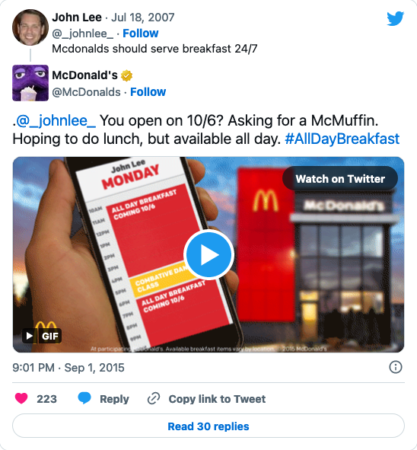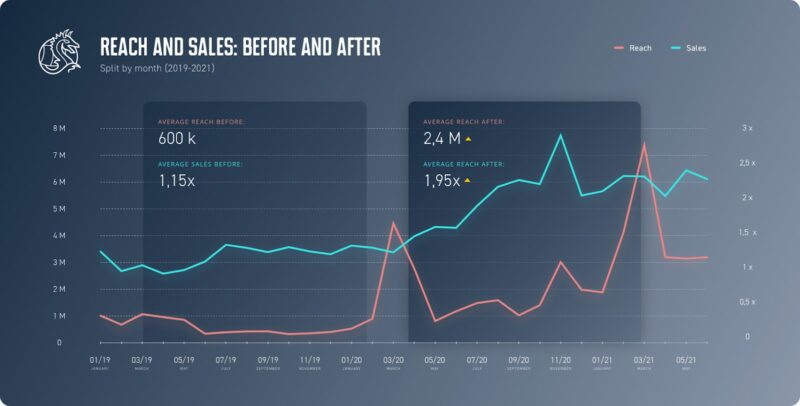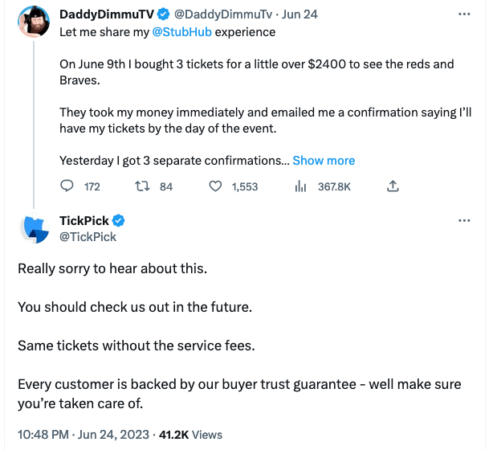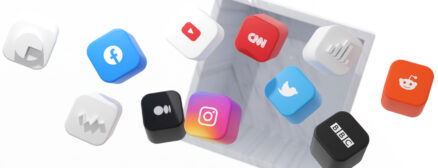Social Listening Simplified, and Why it Matters for Your Business
Like a potato, you can have ears everywhere.
Social listening helps you know what people are saying about your brand and products throughout online spaces, including social media platforms, websites, blogs, video content, forums, review sites, and more. It gives you valuable information in real time, and over time. With social listening tools, you can track conversations, feedback, mentions, and sentiment about your company, industry, social trends, and competitors. It gives you useful, quantifiable data that measures the discussion, even if you’re not mentioned.
A Primer on Understanding Social Listening
The road to clear insights from social media analytics is often bumpy and unclear. Engagement, likes, mentions, tags, interactions, views, clicks — the abundance of social media platforms offer an equal amount of analytics. Social listening clears the path for you to leverage the power of social media analytics to make informed decisions for your business’ success.
The essence of social listening, including social media listening, is this: it’s a method of actively monitoring and analyzing social media conversations in real-time through keywords and other metrics to provide feedback and data about your brand and industry.
The social analytics derived provide genuine, actionable data. This helps understand how and why people are talking about your business and paves a path to turn that into data-driven actions to enhance your entire company.
Social Listening in Action
Imagine you’ve released a new product. People are excitedly discussing it online and on social media, yet, most of them aren’t specifically saying your brand name, or using a hashtag you follow, or they’re accidentally tagging the wrong company. You’re missing the conversation happening, and an opportunity. Utilizing social listening, see what they’re saying, how and why they’re discussing it, and on which platforms. In the moment, you can interact, or create posts based on the sentiment emerging. As time goes, you’ll collect more data and insights on the why of it all to help you build new marketing campaigns and social media strategies.
Also, if people mention pain points, perhaps with the user interface that went under the radar, you can address it with the audience if it warrants, and with the product itself.
Roadmap to the Main Benefits of Social Listening Tools
With social listening, you can know — backed by real numbers — about:
- Brand awareness
- Brand sentiment
- Reputation and crisis management
- Industry and social trends
- Pain points on products
- Consumer insights
- Competitor analysis
- Influencer metrics and identification
- Campaign analysis
- Brand and product mentions (even without being tagged or hashtagged)
More than 60% of businesses believe social listening is a key part of a social media marketing strategy. On top of that, 82% of respondents to the survey said social listening is highly valuable, meaning it’s becoming more likely than not your competitors are using it already.

Source: socialmediatoday.com
The biggest benefit with social listening is having digital ears on all those conversations, helping refine your company. You’ll know in a measurable way how your audience feels, their challenges, needs, and wants, and what platform they’re interacting with about your business and products, so you can engage with them in a relatable way and create strategies in tune with that knowledge.
In 2020, PR Newswire and Statista reported that 33% of people used social media for feedback and complaints about brands and products. And that number has increased since the pandemic, meaning when people talk about your business, they’re letting the whole world know about it, and sometimes not even directly informing you.
Social listening puts you in the conversation, giving you both the how and the why. Social monitoring only gives you the how.
Practical Real-life Social Listening Examples to Mimic
Companies big and small use social listening to great benefit.
Starbucks
Have you wondered how Starbucks can find a Tweet without that person tagging them? It’s because they’ve set their social listening for certain keywords and topics, so they’re able to be present in a positive way, with people who would never expect it.

Source: Twitter.com
This builds brand loyalty and it shows the human side of the company.
Some of the most well-known instances of companies using social listening to their benefit include McDonald’s, Netflix, Spotify, Dove, Taco Bell, and Airbnb. This spans a wide array of industries, so any business could repurpose their social media marketing to their own needs.
McDonald’s
McDonald’s identified the want, and some could say need, for all-day breakfast by not only seeing their direct mentions, but the larger conversation and sentiment. They could quantify the customer feelings through data. Thus, they launched all-day breakfast, showing the audience they’re listening, and letting them feel that, even as a worldwide corporation, McDonald’s still responds to real human feedback.
This example dates back, but it shows how they used social listening to identify an older Tweet, and respond to it as part of the launch, giving the movement another layer of engagement.

Source: Twitter.com
Coca-Cola
Why would perhaps the most well-known worldwide brand need influencers to share anything about them? Take their #thisonesfor campaign, in which they identified select influencers, and used a social media marketing strategy to partner with diverse spokespeople, giving them an audience, engagement, and exposure they might’ve missed via their branded accounts.
Smaller businesses could use social listening plus social trends and solid social media marketing to identify great influencers for their brand and industry, and form a collaborative partnership.

Source: Instagram
Mobile Vikings
Mobile Vikings, an emerging prepaid phone plan and mobile internet company, increased its reach by 300% and sales by 70% in just 12 months by utilizing social listening and implementing social media strategies based on their findings and data.

Source: SentiOne
TickPick
Here, a ticket resale company took advantage of negative sentiment toward another brand by stepping into the feed to mention their product, and how it solves the issue posted.

Source: Twitter.com
Best Practices for Social Listening: Key Strategies for Success
First off, having a sound social media strategy is incredibly important. Above even social media ads, social listening was listed as the second-most indispensable social media strategy in 2023, only behind TikTok.
Social listening can be applied to your brand, but also to specific products, competitors, industries, and topics, not to mention current and future social trends on the horizon.
1. Choose your social listening goals:
- Measuring customer sentiment
- Refining your tone of voice around the brand and products
- Identifying industry trends
- Discovering where people talk about your brand the most
- Refining keywords from your brand and industry
2. Optimize the social media listening part of your social listening approach:
- Authorize your social media platforms to see more mentions
- Identify the valuable platforms for your brand and consider expanding reach on less prominent ones
- Engage with your audience and personalize responses to foster positive relationships
- See which platforms your competitors are performing the best on, and identify if there are gaps in your approach
- Observe changes in technology, industry trends, and social media platforms, as algorithms, preferred media, and style of engagement can change (RIP: GIFs)
3. Cultivate and refine your social listening projects by:
- Clearly defining strategies, goals, and objectives to set the tone of your approach and to acquire the most relevant data
- Continually updating and refreshing keywords (SentiOne features no keyword limit)
- Constructing projects around each competitor to better understand their unique approach
- Creating social listening projects for each campaign, and iterating to improve and adapt based on what you’ve learned
- Applying audience insights, including gender, online activity patterns, and brand sentiment
- Including keywords with abbreviations and misspellings of your business and products (and competitors)
- Tracking industry categories for your brand and products, plus product names, hashtags, slogans, and broader industry terms
4. Make it inclusive inside your company:
- Create labeling systems across goals, such as around certain keywords, brands, products, or sentiments
- Consistently update visuals and reports of the findings
- Share insights and periodic sessions to discuss actionable ideas based on the data
- Have a proper style guide and tone of voice asset that aligns everyone on how and when to respond, what style of response suits your business
- Review what’s working and not working for you, your competitors, and industry
The Impact of Choosing and Using the Right Tool
Back to our smooth road, and clear vision of the path ahead. How did we get here? By identifying and using the right social listening tool.
Worthwhile social listening tools utilize natural language processing algorithms to analyze sentiment based on the tone of voice, context, as well as mood (positive, negative, neutral). As you may know, AI and machine learning are gaining prominence, and a tool that can utilize this to better classify sentiment and constantly improve is a great way to keep your data relevant.
A great social listening tool will:
- Constantly learn, backed by a team that’s constantly learning
- Can properly identify brand sentiment based on natural language processing
- Detects swelling negative feedback to help protect brand reputation
- Turns insights into understandable, actionable data
- Have API integrations with social media platforms to access the information it needs to produce relevant data
- Generates automatic, easy-to-interpret, ready-to-go reports to share with your team
- Is affordable and scalable (did you know that more than 33% of companies using social listening tools spend more than $100K annually?)
- Has an engaged team providing modern insights, tips, trends, and more
Your ride to a smooth social listening experience awaits. Check out more about SentiOne Listen, the AI-powered social listening tool trusted by brands such as Nivea, PepsiCo, and Ogilvy, and get in touch with us to book a demo suited to your needs, industry, and company. BOOK A DEMO today.



